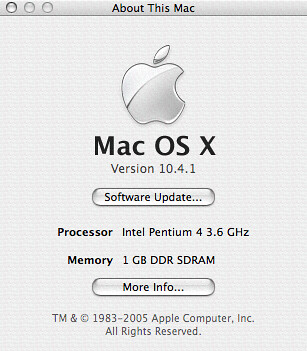Apple is 'Switching'

Apple announced today that beginning in 2006, new Apple computers will run not on IBM's Power PC chip, but on Intel's chip. The transition is brought about by IBM's failure to deliver higher speeds (the 3gig G5) and more importantly Intel's development plans that produce more productivity with lower power wattage usage--think powerbook. They actually confirmed that Marklar exists-from the beginning, OS X has been written to compile on both PPC and Intel all along.
 Really, this means very little to you, typical bible scholars and pastors. It does mean that Macs will get faster quicker and/or possibly less expensive. Newer version of applications will be able to run natively on both older PPC computers or Intel machines. But still, your "old" OS X apps will run on the newer processors via a tranparent translator (which they've named "Rosetta"!) without any performance or speed issues. It will be the end of 2007 before Apple before the entire Macintosh computer line runs on an Intel Pentium processor. It means that apps that currently run only in Classic mode might be left behind (until someone writes a new emulation).
Really, this means very little to you, typical bible scholars and pastors. It does mean that Macs will get faster quicker and/or possibly less expensive. Newer version of applications will be able to run natively on both older PPC computers or Intel machines. But still, your "old" OS X apps will run on the newer processors via a tranparent translator (which they've named "Rosetta"!) without any performance or speed issues. It will be the end of 2007 before Apple before the entire Macintosh computer line runs on an Intel Pentium processor. It means that apps that currently run only in Classic mode might be left behind (until someone writes a new emulation).
For others, especially developers, it means more. It most likely means the death of PPC Linux.
Don't get crazy with the speculation, as does the oft-pleasantly-inciting Ken Ristau. This does not mean that Mac apps will be running on Windows, or vice versa. The applications run off of the OS kernel and API calls, not the chip alone. It will not be possible to run OS X on a generic Intel box, nor Windows on a Mac Intel machine. The combination of custom asic, Apple's nonstandard, nondocumented chipset, and most likely some form of DRM will allow Apple to maintain its control. Speculation is that it might be slightly more possible that the hackers will be able to get Windows running on a Mac Intel box.
It does mean that older applications which fall in the 25% of Mac apps that are currently coded other than in Xcode (Ac*cough*cough*cordance*cough*) will have to do some extra work to transition towards the new Universal Binary. But not immediately. For the next few years, they'll simply still just run.
All in all, it is an exciting day for Mac users.
Followup: I think it's worth repeating quotes from a C-Net interview being discussed in the comments to this post.
Apple Senior Vice President Phil Schiller addressed the issue of running Windows on Macs, saying there are no plans to sell or support Windows on an Intel-based Mac. "That doesn't preclude someone from running it on a Mac. They probably will," he said. "We won't do anything to preclude that." However, Schiller said the company does not plan to let people run Mac OS X on other computer makers' hardware. "We will not allow running Mac OS X on anything other than an Apple Mac," he said.Microsoft won't be making Longhorn so that it can't run on a "Macintel" computer, but you better believe Apple will be doing everything they can to prevent hacks allowing a beige box bootup of OS X.


8 comments:
I'm glad I am "pleasantly" inciting... It be horrible if I wasn't pleasant about it...
I appreciate your much more erudite take on this topic.
Incidentally, what do you make of this quote:
After Jobs' presentation, Apple Senior Vice President Phil Schiller addressed the issue of running Windows on Macs, saying there are no plans to sell or support Windows on an Intel-based Mac. "That doesn't preclude someone from running it on a Mac. They probably will," he said. "We won't do anything to preclude that." CNET.com
Hey Ken,
I saw that quote come across my feed as well. I think it is going to be a given. Windows will be running native on a Macintosh computer. Noone I'm reading (and boy is there alot to read on this news in webdom) can come up with any motivation on Apple's part to prevent folks from running Windows on a Macintosh. They will, however, do everything in their power to make sure that OS X can only run native on a Mac Intel box.
The biggest shocker to me is that the several year long rumor that Apple was secretly compiling OS X for Intel as well all along turns out to be true. They were doing it for a "just in case" scenario. Man, I wish I was that organized and had it that together. Even more so, I wish our churches were that together.
I should've said, Schiller went on to say in the interview: ""We will not allow running Mac OS X on anything other than an Apple Mac."
Two comments:
(1) If Windows will run natively on Mac Intel boxes, how difficult can it be for Mac apps to start running on Windows computers? Aren't the developers themselves going to push this in effort to keep development costs down?
(2) Also, if Windows will run natively on Mac Intel boxes, how can Mac not eventually allow its OS X to run on non-Apple computers? It seems to me that Shiller's quote in this regard is simply an attempt to pretend that hell hasn't completely frozen over. What's more, it is going to be done unofficially if Mac doesn't do it officially first. Just consider PearPC and other such emulators...
Keen observations, Ken. On your number 1, an application compiled to run on a "Macintel" computer will not run on a Windoze machine any more than a Linux app that runs on PPC Linux can currenly run in OS X. However, this certainly means that porting and compiling a Mac app to run on Windoze in most cases is now simpler. In the computer gaming world, that's the current buzz regarding this news. It will be easier for the "hot" games to be released on both Windoze and Mac within a closer timeframe, if not concurrently. That make sense?
As for your number 2, you'd better believe that hackers will do their darndest to get OS X Running on a generic Pentium box. But the combination of hurdles that Apple can put up will make that difficult. While I'd not call it a consensus, the majority opinion right now (the news is barely 24 hours old) is that the hackers will not be successful.
On the contrapositive, consider the boon to Apple sales when business purchaser can now get an Apple Mac that can run either Leopard or Longhorn. Now, we haven't seen Windoze up on a "Macintel" yet... but I don't think you'll be holding your breath long.
With respect to your last point, I'm not sure that business purchasers are looking to Apple for its hardware so much as they'd consider it for their software. I might be wrong but it's my sense that companies like HP/Compaq and Dell have virtually cornered the server markets and, while Mac products are always nifty and stylish, their PC counterparts are usually cheaper, which is the corporate bottom line.
On the software side though, businesses would be drawn to OSX because of its UNIX base and, at least for the present, the lack of viruses written for it. Now that OSX can interact fine with Windows machines and assuming the continued convergence of Mac and PC versions of standard software products, like Adobe, Office, and other such things, I see a great software opportunity if Apple opts for it.
The hardware boon is likely to come from personal users where the stylish computers, coupled with the Windows OS, the success of iPod, and other such things are likely to draw new users. That said, Mac's existing PPCs aren't going to sell very well. It'll be a rough transition for hardware sales, I think.
While I'd not call it a consensus, the majority opinion right now (the news is barely 24 hours old) is that the hackers will not be successful.
Well, I'll dissent from the consensus. I have much more faith in hackers...
Everyone agrees regarding Apple computer, and even software, sales between now and January. I was going to be in the market this Fall for a new computer, but now I'm going to wait until next year. Although, there is some wisdom to grabbing the assuredly excellent prices one will be able to get on the last line of G5's.
Your faith in hacker's ability to get OS X on any old Intel box is not misplaced. It's amazing the things folks take the time to work out... But when we're talking DRM's, we're talking no small hurdle. Hard to estimate, really. It'll be fun to see.
Post a Comment